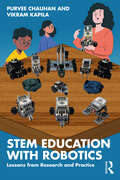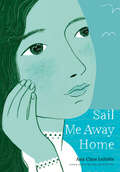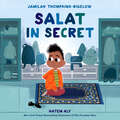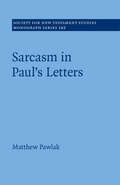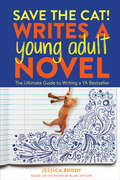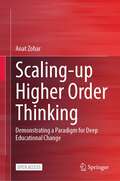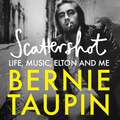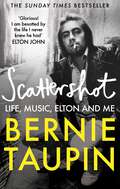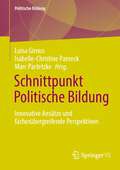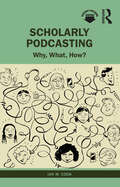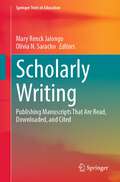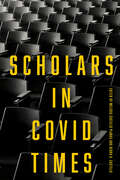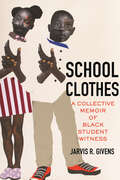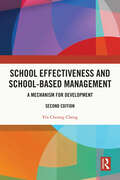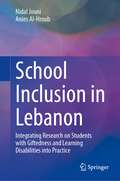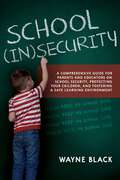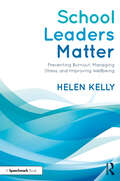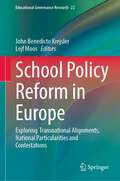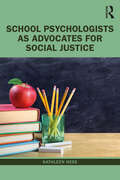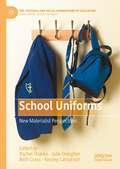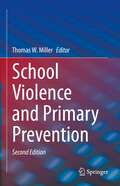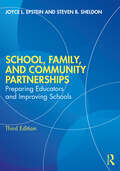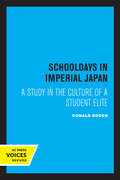- Table View
- List View
STEM Education with Robotics: Lessons from Research and Practice
by Vikram Kapila Purvee ChauhanThis book offers a synthesis of research, curriculum examples, pedagogy models, and classroom recommendations for the effective use of robotics in STEM teaching and learning. Authors Chauhan and Kapila demonstrate how the use of educational robotics can catalyze and enhance student learning and understanding within the STEM disciplines. The book explores the implementation of design-based research (DBR); technological, pedagogical, and content knowledge (TPACK); and the 5E instructional model; among others. Chapters draw on a variety of pedagogical scaffolds to help teachers deploy educational robotics for classroom use, including research-driven case studies, strategies, and standards-aligned lesson plans from real-life settings. This book will benefit STEM teachers, STEM teacher educators, and STEM education researchers.
Sahitya saurabha- 5 patrike- 6 Kadambari Vaisakha, Ayda Sannakategalu Mattu Jivanacaritre Ghi Lohiya: ಸಾಹಿತ್ಯ ಸೌರಭ- 5 ಪತ್ರಿಕೆ- 6 ಕಾದಂಬರಿ ವೈಶಾಖ, ಆಯ್ದ ಸಣ್ಣಕತೆಗಳು ಮತ್ತು ಜೀವನಚರಿತ್ರೆ ಘಿ ಲೋಹಿಯಾ
by Pradhana sampadakaru: Prophesar. Annammaಇದು ಕನ್ನಡ ಕಾದಂಬರಿ: ವೈಶಾಖ, ಆಯ್ದ ಸಣ್ಣಕತೆಗಳು ಮತ್ತು ಜೀವನಚರಿತ್ರೆ ಘಿ: ಲೋಹಿಯಾ ರವರದ್ದು ಮತ್ತು ಬಿ.ಎ. ಐದನೆಯ ಸೆಮಿಸ್ಟರ್ ಸಿ.ಬಿ.ಸಿ.ಎಸ್. ಕನ್ನಡ ಪಠ್ಯ 2018- 19 ನೇ ಶೈಕ್ಷಣಿಕ ವರ್ಷದಿಂದ ಅನುಷ್ಠಾನಗೊಳಿಸಲು ನಿಗದಿಗೊಳಿಸಿದ ಸಿ.ಬಿ.ಸಿ.ಎಸ್. ಹೊಸಪಠ್ಯಪುಸ್ತಕವಾಗಿದೆ.
Sail Me Away Home (Show Me a Sign)
by Ann Clare LeZotteThis gripping, stand-alone story, set in the world of the award-winning Show Me a Sign and Set Me Free, completes a unique and unforgettable trilogy that centers the Deaf experience.As a young teacher on Martha's Vineyard, Mary Lambert feels restless and adrift. So when a league of missionaries invite her to travel abroad, she knows it's a once in a lifetime opportunity. Paris is home to a pioneering deaf school where she could meet its visionary instructors Jean Massieu and Laurent Clerc-and even bring back their methods to help advance formal deaf education in America!But the endeavor comes at a cost: The missionaries' plan to "save" deaf children is questionable at best-and requires Mary's support. What's more, the missionaries' work threatens the Wampanoag and other native peoples' freedom and safety. Is pursuing Mary's own goals worth the price of betraying her friends and her own values?So begins a feverish and fraught adventure, filled with cunning characters, chance encounters, and new friendships. Together with Show Me a Sign and Set Me Free, this stunning story will enrich your understanding of Deaf history and culture, and forever alter your perspective on ability and disability.
Salat in Secret
by Jamilah Thompkins-BigelowFrom the critically acclaimed author of Your Name Is a Song and the bestselling illustrator of The Proudest Blue comes a story about a Muslim boy who receives a salat (prayer) rug on his seventh birthday and becomes empowered about his faith.In this beautiful story of community, family, and acceptance, a boy named Muhammad receives a special salat rug on his seventh birthday. Seven is the age when Muslim children are encouraged to pray, and Muhammad is determined to do all five daily prayers on time. But one salat occurs during the school day--and he's worried about being seen praying at school. His father parks his truck to worship in public places, and people stare at and mock him. Will the same thing happen to Muhammad?In the end, with help from his teacher, he finds the perfect place to pray. Salat in Secret, by two highly acclaimed Muslim creators, is a poignant and empowering look at an important facet of Islam that many observant children cherish but might be scared to share.
Samajashastra Super Companion 5 In 1 Question Bank 1st PUC as Per New Revised Syllabus: ಸಮಾಜಶಾಸ್ತ್ರ ಸೂಪರ್ ಕಂಪ್ಯಾನಿಯನ್ 5 ಇನ್ 1- 1st ಪಿ.ಯು.ಸಿ ಪ್ರಶ್ನೆ ಮತ್ತು ಉತ್ತರ 2023- 14 ನೇ ಹೊಸ ಪರಿಷ್ಕೃತ ಪಠ್ಯ ಕ್ರಮದ ಪ್ರಕಾರ
by Ganga Jyothi G.N. MA. L.L.BNCERT ಹೊಸ ಪಠ್ಯಕ್ರಮದ ಪ್ರಕಾರ ಸೂಪರ್ ಕಂಪ್ಯಾನಿಯನ್ 5-ಇನ್-1 ಸಮಾಜಶಾಸ್ತ್ರ 1ST PUC ಪ್ರಶ್ನೋತ್ತರ ಮಾಲಿಕೆಯಾಗಿದ್ದು. ಇದು 1ST PUC ವಿದ್ಯಾರ್ಥಿಗಳಿಗೆ ಶೈಕ್ಷಣಿಕ ಸಂಪನ್ಮೂಲವಾಗಿದೆ.
Sarcasm in Paul’s Letters (Society for New Testament Studies Monograph Series)
by Matthew PawlakIn this book, Matthew Pawlak offers the first treatment of sarcasm in New Testament studies. He provides an extensive analysis of sarcastic passages across the undisputed letters of Paul, showing where Paul is sarcastic, and how his sarcasm affects our understanding of his rhetoric and relationships with the Early Christian congregations in Galatia, Rome, and Corinth. Pawlak's identification of sarcasm is supported by a dataset of 400 examples drawn from a broad range of ancient texts, including major case studies on Septuagint Job, the prophets, and Lucian of Samosata. These data enable the determination of the typical linguistic signals of sarcasm in ancient Greek, as well as its rhetorical functions. Pawlak also addresses several ongoing discussions in Pauline scholarship. His volume advances our understanding of the abrupt opening of Galatians, diatribe and Paul's hypothetical interlocutor in Romans, the 'Corinthian slogans' of First Corinthians, and the 'fool's speech' found within Second Corinthians 10-13.
Save the Cat! Writes a Young Adult Novel: The Ultimate Guide to Writing a YA Bestseller (Save the Cat!)
by Jessica BrodyAn indispensable guide in the bestselling Save the Cat! story structure series that reveals the 15 essential plot points needed to make any young adult novel a success, from an accomplished novelist and the author of Save the Cat! Writes a Novel.In Save the Cat! Writes a Young Adult Novel, prolific author and story coach Jessica Brody presents a comprehensive story structure guide for anyone who wants to write a young adult novel by applying the famed Save the Cat! screenwriting methodology to the world of YA fiction. In this book, you will learn: • The fifteen &“beats&” (or plot points) that are necessary for crafting a successful story with a compelling character arc—including the Opening Image, Catalyst, Fun and Games, Bad Guys Close In, Dark Night of the Soul, and Finale• The ten universal story genres that will help you drill into what makes your type of story work, including those most commonly found in young adult novels like Rites of Passage, Superhero, Buddy Love, Institutionalized, and Golden Fleece• Quirky, original insights and writing tips like &“Save the Cat,&” the &“Shard of Glass,&” and the &“Dark Night Epiphany,&” that help you craft a story that will thrill and captivate teen readersFilled with practical advice, easy-to-follow templates, and &“beat sheets&” analyzing the structure of popular young adult novels such as Leigh Bardugo&’s Six of Crows, John Green&’s The Fault in Our Stars, and Lois Lowry&’s The Giver, this book is the ultimate reference for anyone who&’s ever dreamed of writing their own young adult bestseller.
Scaling-up Higher Order Thinking: Demonstrating a Paradigm for Deep Educational Change
by Anat ZoharThis open access book addresses the evasive problem of why truly effective educational innovation on a wide scale is so difficult to achieve, and what leaders may do about this. Examining the case of system-wide reform processes centering on teaching a thinking-rich curriculum, it discusses general issues pertaining to implementing deep, large-scale changes in the core of learning and instruction. The book emphasizes challenges related to professional development, assessment, achievement gaps, and the tension between knowledge and skills in 21st century curricula. It summarizes insights the author has gained from approximately 25 years of engaging with these topics both as an academic and as a practitioner who led a national change process.With a Forward by David Perkins
Scattershot: Life, Music, Elton and Me
by Bernie Taupin'This is the most glorious of books. I am besotted by the life I never knew he had.' -Elton John'Orgasmic. Every page of Scattershot is a delight, a joy, a name-dropper fan's delight. Divine. I couldn't put it down.' -Pete Townshend'In Bernie Taupin's miraculous memoir Scattershot you'll meet legends, cowboys, geniuses, unforgettable faces in the night, shady purveyors of outrageous fortune, warriors of the heart, and most of all, Taupin himself. Hilarious and so emotionally true, Scattershot is like a letter from a cherished friend. You'll want to keep it close, so you can read it again and again.' -Cameron Crowe'Touching. Charming. Humble. Witty. And exquisitely written. Taupin's words need no musical accompaniment. They sing with a poets voice.' -Gary Oldman'Eloquent and inspiring, Scattershot is a freewheeling memoir that is as warm and evocative as Bernie Taupin's most memorable lyrics. A born storyteller, Taupin gives us the life of an artist whose outlook was shaped by a rare but fascinating blend of lifelong innocence and endless intellectual curiosity.' -Robert Hilburn, author of Johnny Cash: The Life"I loved writing, I loved chronicling life and every moment I was cogent, sober, or blitzed, I was forever feeding off my surroundings, making copious notes as ammunition for future compositions. . . . The thing is good, bad or indifferent I never stopped writing, it was as addictive as any drug."This is the memoir music fans have been waiting for. Half of one of the greatest creative partnerships in popular music, Bernie Taupin is the man who wrote the lyrics for Elton John, who conceived the ideas that spawned countless hits, and sold millions and millions of records. Together, they were a duo, a unit, an immovable object. Their extraordinary, half-century-and-counting creative relationship has been chronicled in biopics (like 2019's Rocketman) and even John's own autobiography, Me. But Taupin, a famously private person, has kept his own account of their adventures close to his chest, until now.Written with honesty and candour, Scatterhot allows the reader to witness events unfolding from Taupin's singular perspective, sometimes front and center, sometimes from the edge, yet always described vibrantly, with an infectious energy that only a vivid songwriter's prose could offer. From his childhood in the East Midlands of England whose imagination was sparked and forever informed by the distinctly American mythopoetics of country music and cowboys, to the glittering, star-studded fishbowl of '70s and '80s Beverly Hills, Scattershot is simultaneously a Tom Jones-like picaresque journey across a landscape of unforgettable characters, as well as a striking, first-hand account of a creative era like no other and one man's experience at the core of it.An exciting, multi-decade whirlwind, Scattershot whizzes around the world as we ride shotgun with Bernie on his extraordinary life. We visit New York with him and Elton on the cusp of global fame. We spend time with him in Australia almost in residency at an infamous rock 'n' roll hotel in an endless blizzard of drugs. And we spend late, late night hours with John Lennon, with Bob Marley, and hanging with Frank Sinatra. And beyond the world of popular music, we witness memorable encounters with writers like Graham Greene, painters like Andy Warhol and Salvador Dali, and scores of notable misfits, miscreants, eccentrics, and geniuses, known and unknown. Even if they're not famous in their own right, they are stars on the page, and we discover how they inspired the indelible lyrics to songs such as "Tiny Dancer," "Candle in the Wind," "Bennie and The Jets," and so many more.Unique and utterly compelling, Scattershot will transport the reader across the decades and around the globe, along the way meeting some of the greatest creative minds of the 20th century, and in
Scattershot: Life, Music, Elton and Me
by Bernie Taupin'This is the most glorious of books. I am besotted by the life I never knew he had.' -Elton John'Orgasmic. Every page of Scattershot is a delight, a joy, a name-dropper fan's delight. Divine. I couldn't put it down.' -Pete Townshend'In Bernie Taupin's miraculous memoir Scattershot you'll meet legends, cowboys, geniuses, unforgettable faces in the night, shady purveyors of outrageous fortune, warriors of the heart, and most of all, Taupin himself. Hilarious and so emotionally true, Scattershot is like a letter from a cherished friend. You'll want to keep it close, so you can read it again and again.' -Cameron Crowe'Touching. Charming. Humble. Witty. And exquisitely written. Taupin's words need no musical accompaniment. They sing with a poets voice.' -Gary Oldman'Eloquent and inspiring, Scattershot is a freewheeling memoir that is as warm and evocative as Bernie Taupin's most memorable lyrics. A born storyteller, Taupin gives us the life of an artist whose outlook was shaped by a rare but fascinating blend of lifelong innocence and endless intellectual curiosity.' -Robert Hilburn, author of Johnny Cash: The LifeThis is the memoir music fans have been waiting for. Half of one of the greatest creative partnerships in popular music, Bernie Taupin is the man who wrote the lyrics for Elton John, who conceived the ideas that spawned countless hits, and sold millions and millions of records. Together, they were a duo, a unit, an immovable object. Their extraordinary, half-century-and-counting creative relationship has been chronicled in biopics (like 2019's Rocketman) and even John's own autobiography, Me. But Taupin, a famously private person, has kept his own account of their adventures close to his chest, until now.Written with honesty and candour, Scatterhot allows the reader to witness events unfolding from Taupin's singular perspective, sometimes front and center, sometimes from the edge, yet always described vibrantly, with an infectious energy that only a vivid songwriter's prose could offer. From his childhood in the East Midlands of England whose imagination was sparked and forever informed by the distinctly American mythopoetics of country music and cowboys, to the glittering, star-studded fishbowl of '70s and '80s Beverly Hills, Scattershot is simultaneously a Tom Jones-like picaresque journey across a landscape of unforgettable characters, as well as a striking, first-hand account of a creative era like no other and one man's experience at the core of it.An exciting, multi-decade whirlwind, Scattershot whizzes around the world as we ride shotgun with Bernie on his extraordinary life. We visit New York with him and Elton on the cusp of global fame. We spend time with him in Australia almost in residency at an infamous rock 'n' roll hotel in an endless blizzard of drugs. And we spend late, late night hours with John Lennon, with Bob Marley, and hanging with Frank Sinatra. And beyond the world of popular music, we witness memorable encounters with writers like Graham Greene, painters like Andy Warhol and Salvador Dali, and scores of notable misfits, miscreants, eccentrics, and geniuses, known and unknown. Even if they're not famous in their own right, they are stars on the page, and we discover how they inspired the indelible lyrics to songs such as "Tiny Dancer," "Candle in the Wind," "Bennie and The Jets," and so many more.Unique and utterly compelling, Scattershot will transport the reader across the decades and around the globe, along the way meeting some of the greatest creative minds of the 20th century, and into the vivid imaginings of one of music's most legendary lyricists.
Schnittpunkt Politische Bildung: Innovative Ansätze und fächerübergreifende Perspektiven (Politische Bildung)
by Marc Partetzke Isabelle-Christine Panreck Luisa GirnusDie multiplen Krisenerscheinungen unserer Zeit bleiben nicht ohne Konsequenzen für die Politische Bildung, zu deren Zielen die Befähigung ihrer Adressat:innen zur kompetenten Teilnahme und Teilhabe am gesellschaftlichen Leben gehört. Insofern verwundert es denn auch nicht, dass sich die Praxis Politischer Bildner:innen aus ganz unterschiedlichen wissenschaftlichen Disziplinen speist. Der Band nimmt sowohl Schnittmengen der Politikdidaktik mit anderen wissenschaftlichen Disziplinen als auch die der Politischen Bildung mit anderen Domänen in den Blick und will die spezifischen Perspektiven auf die globalen Herausforderungen unserer Zeit in einen konstruktiven Austausch bringen.
Scholarly Podcasting: Why, What, How?
by Ian M. CookExploring what academic podcasting is and what it could be, this book is the first to consider the why, what, and how academics engage with this insurgent, curious craft. Featuring interviews with 101 podcasting academics, including scholars and teachers of podcasting, this book explores the motivations of scholarly podcasters, interrogates what podcasting does to academic knowledge, and leads potential podcasters through the creation process from beginning to end. With scholarship often trapped inside expensive journals, wrapped in opaque language, and laced with a standoffish tone, this book analyses the implications of moving towards a more open and accessible form. This book will also inform, inspire, and equip scholars of any discipline, rank, or affiliation who are considering making a podcast or who make podcasts with the background knowledge and technical and conceptual skills needed to produce high-quality podcasts through a reflexive critique of current practices.
Scholarly Writing: Publishing Manuscripts That Are Read, Downloaded, and Cited (Springer Texts in Education)
by Mary Renck Jalongo Olivia N. SarachoThis book on scholarly writing offers a unique, evidence-based, technology-supported approach to writing for publication across the disciplines. It is suitable both as a graduate level textbook and as support for faculty seeking professional development in scholarly writing. It is a sequel to Writing for Publication: Transitions and Tools That Support Scholars’ Success. Current issues in Academia--such as the expectation that graduate students will publish, the option for doctoral students to publish in lieu of writing the dissertation, the pressure on scholars from various countries to contribute to professional journals written in English, and the metrics used to assess impact of published work—have influenced scholarly writing. Unlike other books on the topic, every chapter includes narratives of experience, self-assessment tools, guided practice activities, reviews of research, and discussion of controversies in publishing. All chapters incorporate curated online resources and technology supports as well. Across the spectrum of experience, ranging from aspiring author to prolific, readers are guided in ways to generate manuscripts that are not only readable and publishable but also downloaded and respectfully cited by their professional peers.
Scholars in COVID Times (Publicly Engaged Scholars: Identities, Purposes, Practices)
by Melissa Castillo Planas and Debra A. CastilloScholars in COVID Times documents the new and innovative forms of scholarship, community collaboration, and teaching brought about by the COVID-19 pandemic. In this volume, Melissa Castillo Planas and Debra A. Castillo bring together a diverse range of texts, from research-based studies to self-reflective essays, to reexamine what it means to be a publicly engaged scholar in the era of COVID.Between social distancing, masking, and remote teaching—along with the devastating physical and emotional tolls on individuals and families—the disruption of COVID-19 in academia has given motivated scholars an opportunity (or necessitated them) to reconsider how they interact with and inspire students, conduct research, and continue collaborative projects. Addressing a broad range of factors, from anti-Asian racism to pedagogies of resilience and escapism, digital pen pals to international performance, the essays are connected by a flexible, creative approach to community engagement as a core aspect of research and teaching. Timely and urgent, but with long-term implications and applications, Scholars in COVID Times offers a heterogeneous vision of scholarly and pedagogical innovation in an era of contestation and crisis.
School Clothes: A Collective Memoir of Black Student Witness
by Jarvis R. GivensA chorus of Black student voices that renders a new story of US education—one where racial barriers and violence are confronted by freedom dreaming and resistanceBlack students were forced to live and learn on the Black side of the color line for centuries, through the time of slavery, Emancipation, and the Jim Crow era. And for just as long—even through to today—Black students have been seen as a problem and a seemingly troubled population in America&’s public imagination.Through over one hundred firsthand accounts from the nineteenth and twentieth centuries, Professor Jarvis Givens offers a powerful counter-narrative in School Clothes to challenge such dated and prejudiced storylines. He details the educational lives of writers such as Zora Neale Hurston and Ralph Ellison; political leaders like Mary McLeod Bethune, Malcolm X, and Angela Davis; and Black students whose names are largely unknown but who left their marks nonetheless. Givens blends this multitude of individual voices into a single narrative, a collective memoir, to reveal a through line shared across time and circumstance: a story of African American youth learning to battle the violent condemnation of Black life and imposed miseducation meant to quell their resistance.School Clothes elevates a legacy in which Black students are more than the sum of their suffering. By peeling back the layers of history, Givens unveils in high relief a distinct student body: Black learners shaped not only by their shared vulnerability but also their triumphs, fortitude, and collective strivings.
School Effectiveness and School-Based Management: A Mechanism for Development
by Yin Cheong ChengThis new edition of an internationally renowned classic book provides a new comprehensive framework of latest perspectives and findings, fills gaps in the ongoing research, policy and practice, and re-engineers a school-based mechanism for understanding and managing school-based development initiatives. The book addresses the burning issues about how school-based management (SBM) and school effectiveness should be related to the new paradigm in education and the third wave of education reforms worldwide. The book includes four parts and 12 chapters covering (1) School Effectiveness (i.e., multiple school functions, models of effectiveness and pursuit of dynamic effectiveness); (2) SBM (i.e., theories of SBM, multi-level self-management (SM), and its implementation); (3) Leadership for Change (i.e., leadership for SBM, staff development, school-based change, and curriculum change); and (4) Future Developments (i.e., an SBM mechanism for effectiveness and paradigm shift towards the third wave). The framework and related analysis will benefit the understanding, policy formulation, school practice and research of the key stakeholders including policy makers, educators, change agents, researchers and those concerned in facing the challenges from the ongoing education reforms in different parts of the world.
School Inclusion in Lebanon: Integrating Research on Students with Giftedness and Learning Disabilities into Practice
by Anies Al-Hroub Nidal JouniThis book addresses the impact of inclusion on the performance of students with and without special needs in Lebanese schools. It examines the performance of regular students to the performance of students with learning disabilities (LD) and gifted students as perceived by them to identify the population that is best served by inclusion. The book investigates three domains affecting student performance in inclusive settings: management and organization. Teaching and learning, and student support and school ethos. In addition, it compares the ways in which these domains affect student performance for each population. In addition, the book presents a detailed description of the inclusive practices that affect student performance and the indicators that contribute most positively to fostering the performance of regular students, gifted students, and students with LD. Finally, it describes the inclusion model applied and proved empirically to affect the positive performance of all student groups as a response to the increasing call for inclusive schooling in Lebanon. Key areas of coverage include: Inclusive education, social justice, and equity in Lebanese schools. Student perceptions of inclusion in Lebanon. Inclusion of gifted learners and students with learning disabilities. Comparison of student performance among different populations in inclusive settings. Domains affecting student performance in inclusive settings. Proposed model of student inclusion in Lebanese schools. School Inclusion in Lebanon is an essential resource for researchers, professionals and policymakers, and graduate students in such interrelated fields as school psychology, inclusive education / educational psychology, and social work.
School Insecurity: A Comprehensive Guide for Parents and Educators on School Security, Protecting Your Children, and Fostering a Safe Learning Environment
by Wayne BlackThe must-have school safety guide for any parent and professional ready to make a changeIs your child safe at school? Who makes the decisions about your child&’s safety and security when you send them off to school each day? What does a truly safe school look like? Does your school have an adequate security plan? How can we prevent the unthinkable? It's time to talk about what the parenting books don't teach you: the unmentionable events that occur in US schools every year and how to try to prevent them with invaluable information. Every time you turn on the news, it seems like there is another active threat on a school in the United States. From Columbine and Uvalde to Parkland and Virginia Tech (to name a few), these unimaginable attacks have brought death, severe injuries and mental trauma upon too many of our country's precious children and teachers. It is 100% certain that another school shooting will occur, yet many people still deny that it could happen at their school. This is a dangerous normalcy bias that puts lives at risk. If it&’s predictable, it&’s preventable. Just when you think it can&’t happen here, it does. In this comprehensive guidebook for parents and professionals, Wayne Black utilizes over forty-five years of security experience in both the private and public sectors to educate you on: Who is responsible for your school&’s safety and security How to talk to the school board and administration about security policy The most effective physical safeguards for preventing an attack How to detect and report observable concerning behavior The role of security and law officers in schools Easy-to-follow pathways for you to push for positive change when and where it is needed plus simple, helpful checklists to quickly assess school safety It&’s time for parents to get involved in their children&’s safety at school. In the words of Lori Alhadeff, a parent who lost her daughter at Parkland and founder of Make Our Schools Safe, &“Your voice is your power.&”
School Leaders Matter: Preventing Burnout, Managing Stress, and Improving Wellbeing
by Helen KellyThis book outlines practical steps that both government and schools can implement to significantly reduce the demands placed upon school leaders. It also provides highly effective tools and strategies to enable school leaders to reflect upon and improve their own wellbeing. Packed full of research-led approaches this book: Examines school leader burnout, what causes it, how to recognise it, and how to prevent it Reflects on why school leaders fail to prioritise their own needs and how this can be addressed Provides a comprehensive framework for schools to support leader thriving and resilience Shares effective, evidence-based coping strategies for leaders. This is a must-read book for all school leaders and those looking to support and improve school leader wellbeing.
School Policy Reform in Europe: Exploring Transnational Alignments, National Particularities and Contestations (Educational Governance Research #22)
by Lejf Moos John Benedicto KrejslerThis book discusses national school policy reforms in a number of key European countries and shows how these are framed in transnational collaborations that meet with national particularities and contestations. It gives an overview of school policy developments that represents the diversity of Europe within a comparative framework.It takes point of departure in the fact that European countries in their school and education policies have been increasingly aligning with each other, mostly via transnational collaborations, the OECD, EU, and the Bologna Process. Even the IEA has been instrumental to motivate alignments by means of influential surveys, knowledge production and methodological development. This alignment in terms of common standards, social technologies, qualification frameworks and so forth have aimed at facilitating mobility of students, workers, business and so forth as well as fostering a European identity among citizens from Europe’s patchwork of small and medium-size countries, representing a patchwork of different languages, cultures and societal contexts. In national recontextualizations, however, alignments have been continuously contested according to the particularities of what has been possible educationally and politically in the different national contexts. Furthermore, the return of national(isms) as well as the rise of edubusiness and digitalization have been increasingly influential. This book thus concludes that increasing transnational alignments have to be observed with meticulous attention to different national contexts that matter greatly.
School Psychologists as Advocates for Social Justice
by Kathleen NessSchool Psychologists as Advocates for Social Justice explores how school psychologists promote and protect the educational rights of children, using the author’s extensive experience as illustration. The roles of school psychologists have expanded from strictly assessment to advising school districts on how to improve school climate, helping schools face tragedy, and counseling students dealing with trauma. Combined with pertinent research, personal narratives describe challenges the author faced while a teacher and later as a school psychology practitioner and illustrate how necessary advocacy is in addressing the academic, behavioral, and emotional needs of students. Careful consideration is given to equity issues of disability, racism, Islamophobia, and bilingualism in schools. Combining informative personal experience with research, emphasizing the importance of children’s rights within the school community, and encouraging effective advocacy with legislative leaders, this book is a necessity for both new and seasoned school psychologists.
School Uniforms: New Materialist Perspectives (The Cultural and Social Foundations of Education)
by Rachel Shanks Julie Ovington Beth Cross Ainsley CarnarvonThis edited volume brings together a new materialist approach to understanding the various legacies and controls being exercised through school uniforms. Through examining school uniform policies, the editors and their authors highlight the embodied choices that contribute to a socio-materialist understanding of democracy and social justice. Uniform policy plays a distinct role in setting the culture of compulsory school education and as such it constitutes a set of under-theorised school practices. This work thus brings together critical perspectives from education, sociology, cultural and postcolonial studies within an overarching analysis of how uniform imposes performances that have a formative effect on young people’s identities and economic positionality.
School Violence and Primary Prevention
by Thomas W. MillerThis important new work covers clinical issues in treating victims of school violence and assessing children with the potential for violence. The editor also examines the effectiveness of prevention intervention programs and offers larger policy recommendations. The book looks at environmental factors such as cultural issues on behaviors from bullying to mass school shootings. And uniquely, the book delves into topics such as sexual boundaries and body image. In all, this book aims for a theoretical and applied picture of the current state of school violence and prevention.
School, Family, and Community Partnerships: Preparing Educators and Improving Schools
by Joyce L. Epstein Steven B. SheldonSchool, Family, and Community Partnerships: Preparing Educators and Improving Schools, 3rd Edition prepares future teachers and administrators to conduct effective and equitable programs of family and community engagement that contribute to student success in school. Renowned authors Joyce L. Epstein and Steven B. Sheldon present the theories, research, policies, and practices that have been shown to improve the design and conduct of partnership programs in diverse communities and at all grade levels. Chapters include a historic overview of early research, recent studies with advanced methods, and many examples of research-based approaches for district leadership and school improvement. All chapters include discussion questions and classroom assignments that professors may use to provoke thinking and help future educators understand that family and community engagement is part of their professional work. New in this 3rd Edition: Updated, streamlined readings make it easy for students to explore early, influential studies that framed the field and recent studies of multilevel effects of leadership for partnerships. Comments, discussion topics, and classroom activities challenge students to think deeply about many aspects and issues of school, family, and community partnerships. Interview assignments enable students to hear the voices and views on partnerships of practicing educators, parents, students, and others in the community. Readings and activities across chapters help colleges and universities meet new standards of the Council for the Accreditation of Educator Preparation (CAEP) for graduates to "demonstrate their ability to effectively work with diverse P-12 students and their families." After decades of research and exemplary practice that confirm that family and community engagement is an essential component of good school organization, most new teachers and administrators still are unprepared to partner with all families to support student learning and development. This book will help professors in Schools, Colleges, and Departments of Education (SCDE) prepare their graduates to understand, organize, and continually improve partnership programs in all schools, with all families, and for all students.
Schooldays in Imperial Japan: A Study in the Culture of a Student Elite
by Donald T. RodenThis title is part of UC Press's Voices Revived program, which commemorates University of California Press’s mission to seek out and cultivate the brightest minds and give them voice, reach, and impact. Drawing on a backlist dating to 1893, Voices Revived makes high-quality, peer-reviewed scholarship accessible once again using print-on-demand technology. This title was originally published in 1980.
